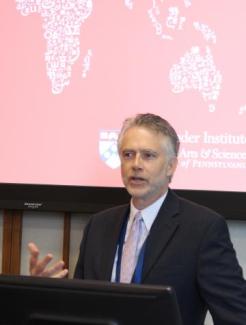
A conversation with Kristen de Groot, Penn Today
The murder of former Prime Minister Shinzo Abe by a gunman who fired a homemade weapon during a campaign stop shocked Japan, which has some of the world’s strictest gun laws. Abe, who was Japan’s longest-serving prime minister before stepping down in 2020, died at a hospital. He was 67.
Penn Today spoke to Frederick R. Dickinson, professor of Japanese history and director of the Center for East Asian Studies, to get his take on Abe’s impact on Japan, foreign policy, and lessons we can draw from his killing.
What would you say is Abe’s legacy?
He’s pivotal in post-war Japanese politics, not simply because he was in power for eight years but because his first and second terms are both very significant. The significance of his legacy became more prominent in his second term because he succeeded the Democratic Party of Japan, which had been in power for three years, which is unheard of in post-war Japanese politics. Essentially the Liberal Democratic Party has been in power for most of the time. The longest stretch in which it wasn’t in power was 2009-2012, when you had three Democratic Party of Japan prime ministers and Japanese foreign policy moving in a very different direction to the extent that Washington was beginning to get very concerned.
I always associated the U.S.-Japan security alliance with the Cold War, and after that was over I kept looking for the Japanese to precipitously drift away from the U.S.-Japan security alliance, and it was beginning to happen under the left-leaning Democratic Party of Japan. The moment Abe came back in 2012, it was such a turnaround. In February of 2013 he met with President Obama, and his first great gift was to tell Obama that he’d deliver the Trans Pacific Partnership (TPP) for him. This was America’s post-Cold War effort to try to maintain some authority in the Pacific. The U.S. was very serious about it for a long time, but the Japanese, particularly under the Democratic Party of Japan, could not deliver any kind of domestic support that had to go along with it. So, Abe’s promise to deliver the TPP to the U.S. was the beginning of a very close relationship, and that followed even with the Trump administration.
My area of expertise is the early 20th century and there was a similar phenomenon going on after the First World War. The Japanese were very important members of the coalition fighting against the Germans and the Austro-Hungarian Empire in the First World War and became a key partner after the Paris Peace Conference. You get the same sense with Abe in a post-Cold War era. Here we have Japan very much central to a liberal internationalist post-Cold War agenda. Even though Abe’s politics are much more conservative than Japan’s leaders in the 1920s, it’s a similar kind of effect, and that’s quite remarkable.
What were his top successes as a leader and his major failures?
I would say his biggest successes are his economic and foreign policy components which were not only central to a new liberal internationalist agenda after the end of the Cold War but in many ways were leading it.
In his first administration, he came up with the idea of ‘the Quad,’ or the Quadrilateral Security Dialogue and the idea of a free and open Indo-Pacific. He’s the first one to articulate it in 2007, and several years later the U.S. appropriated the strategy as its own. Even in the 1920s, when the Japanese were pivotal to a liberal internationalist global agenda, they were not leading the agenda in the way that Abe was. This geopolitical innovation also had a domestic political component: Normalizing Japanese defense capacity and institutionalizing a defense ministry and committing Japan to collective security in a way that, because of the postwar constitution, they weren’t able to before.
Economically speaking, his first administration was pump-priming the economy, something that everyone else took as a model after the 2008 financial crisis. Under Abe, you see an economic realm where Japan seems to be a global leader.
It’s pretty impressive it still stands tall after the so-called lost 30 years and Fukushima. Japan remains a pivotal world economy and global innovator. In many ways the Japanese are a canary in the coal mine. What they experience, everyone else in the industrialized world ultimately experiences.
In terms of failures, there was something that came up in the general election last year. The opposition parties decried the fact that Abe’s pro-growth policies exacerbated the disparities of wealth within Japan to a greater extent than ever before. This is a typical ramification of aggressive growth policies, and, ironically, current Prime Minister Fumio Kishida, in his candidacy for the head of the Liberal Democratic Party last year, essentially appropriated this criticism of Abe from the Constitutional Democratic Party of Japan. He made it his own, saying that Japan needs a friendlier, less bifurcated society, and we need to work on that. I would put that as one of the great challenges that remain that Kishida himself is trying to tackle.
Read the entire interview HERE
